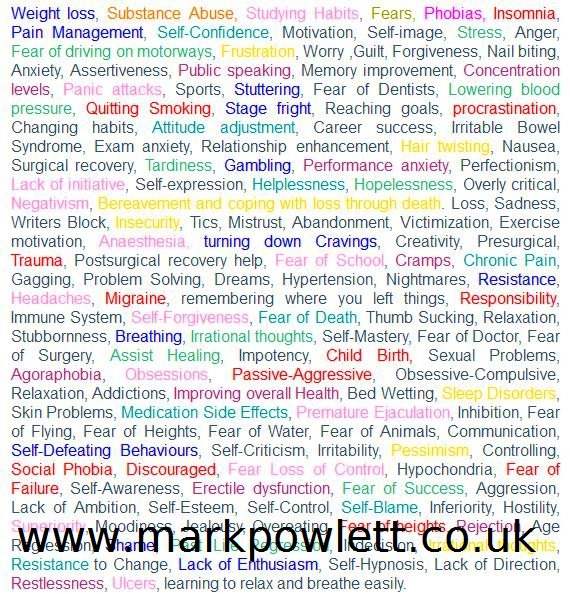150 things that Hypnosis can help you with today
Posted on
This blog is unlike any other that I have written.It's not as wordy as normal...or is it just words?!
What can you use hypnotherapy for...take a deep breath and read on. I’ve got to 150 different things that hypnosis can help you with...but I think there are many many more...I hope you like lists!
Weight loss, Substance Abuse, Studying Habits, Fears, Phobias, Insomnia, Pain Management, Self-Confidence, Motivation, Self-image, Stress, Anger, Fear of driving on motorways, Frustration, Worry ,Guilt, Forgiveness, Nail biting, Anxiety, Assertiveness, Public speaking, Memory improvement, Concentration levels, Panic attacks, Sports, Stuttering, Fear of Dentists, Lowering blood pressure, Quitting Smoking, Stage fright, Reaching goals, procrastination, Changing habits, Attitude adjustment, Career success, Irritable Bowel Syndrome, Exam anxiety, Relationship enhancement, Hair twisting, Nausea, Surgical recovery, Tardiness, Gambling, Performance anxiety, Perfectionism, Lack of initiative, Self-expression, Helplessness, Hopelessness, Overly critical, Negativism, Bereavement and coping with loss through death. Loss, Sadness, Writers Block, Insecurity, Tics, Mistrust, Abandonment, Victimization, Exercise motivation, Anaesthesia, turning down Cravings, Creativity, Presurgical, Trauma, Postsurgical recovery help, Fear of School, Cramps, Chronic Pain, Gagging, Problem Solving, Dreams, Hypertension, Nightmares, Resistance, Headaches, Migraine, remembering where you left things, Responsibility, Immune System, Self-Forgiveness, Fear of Death, Thumb Sucking, Relaxation, Stubbornness, Breathing, Irrational thoughts, Self-Mastery, Fear of Doctor, Fear of Surgery, Assist Healing, Impotency, Child Birth, Sexual Problems, Agoraphobia, Obsessions, Passive-Aggressive, Obsessive-Compulsive, Relaxation, Addictions, Improving overall Health, Bed Wetting, Sleep Disorders, Skin Problems, Medication Side Effects, Premature Ejaculation, Inhibition, Fear of Flying, Fear of Heights, Fear of Water, Fear of Animals, Communication, Self-Defeating Behaviours, Self-Criticism, Irritability, Pessimism, Controlling, Social Phobia, Discouraged, Fear Loss of Control, Hypochondria, Fear of Failure, Self-Awareness, Erectile dysfunction, Fear of Success, Aggression, Lack of Ambition, Self-Esteem, Self-Control, Self-Blame, Inferiority, Hostility, Superiority, Moodiness, Jealousy, Overeating, Fear of heights, Rejection, Age Regression, Shame, Past Life Regression, Indecision, Irrational thoughts, Resistance to Change, Lack of Enthusiasm, Self-Hypnosis, Lack of Direction, Restlessness, Ulcers, learning to relax and breathe easily.
Mark Powlett Hypnotherapy
www.markpowlett.co.uk
Tel: 07980 233160
150 things hypnosis can help you with:
